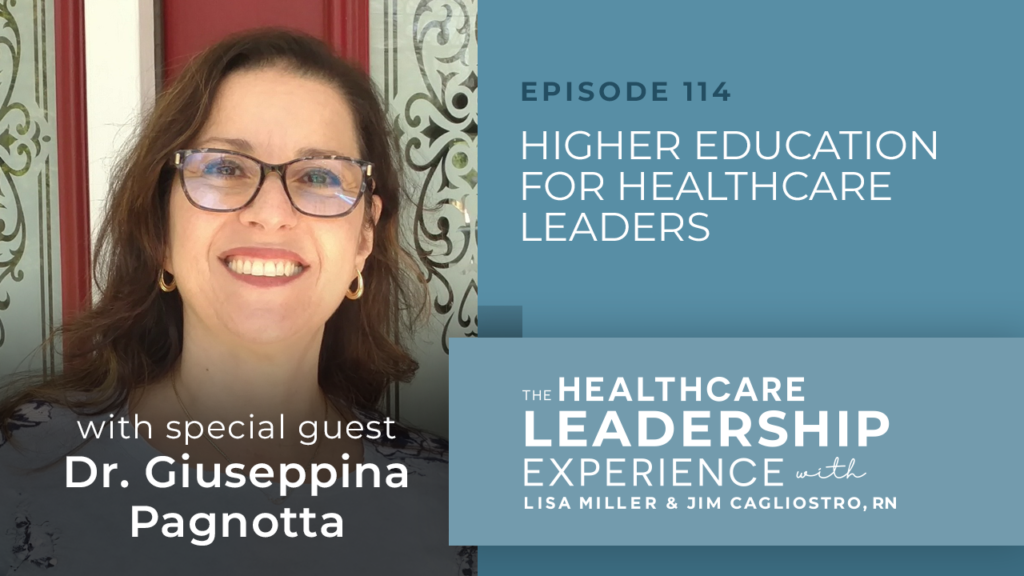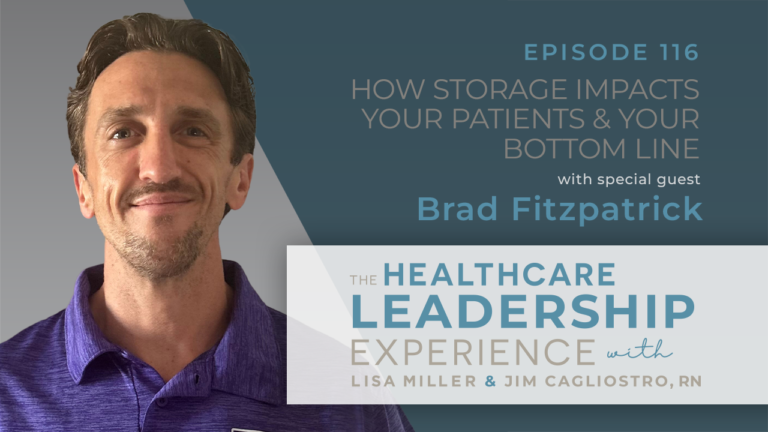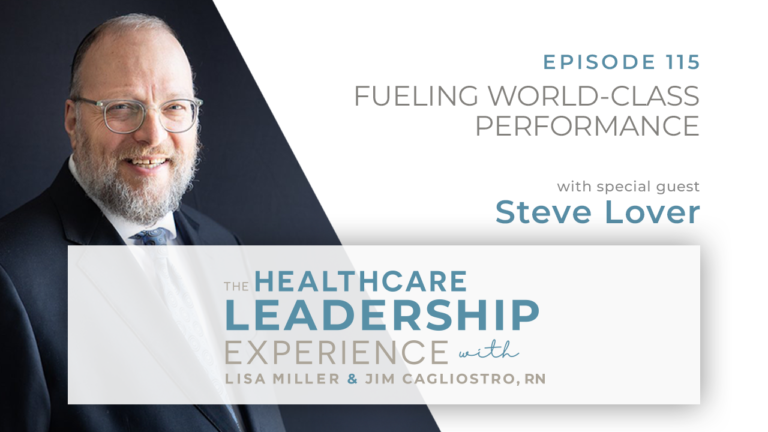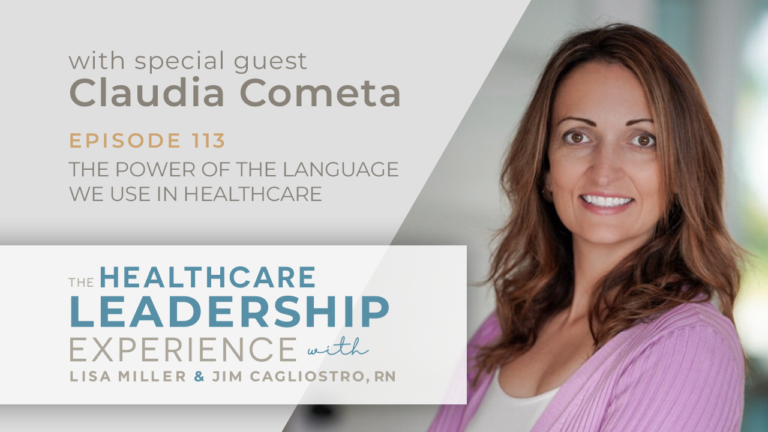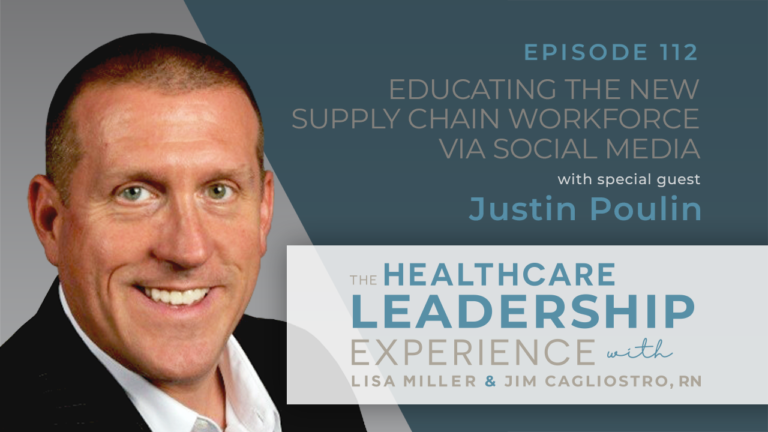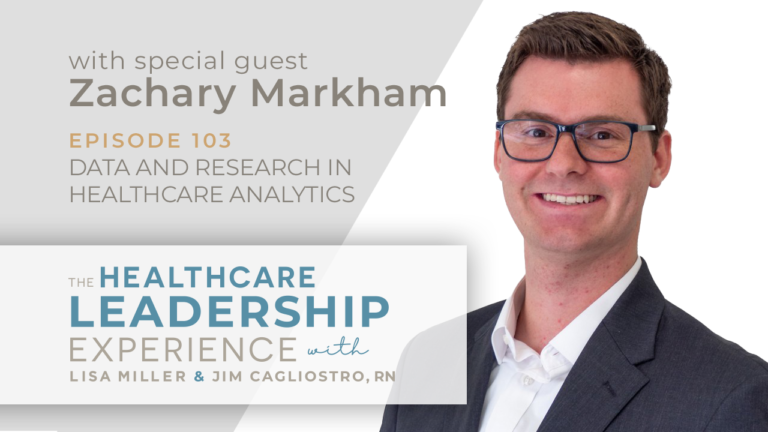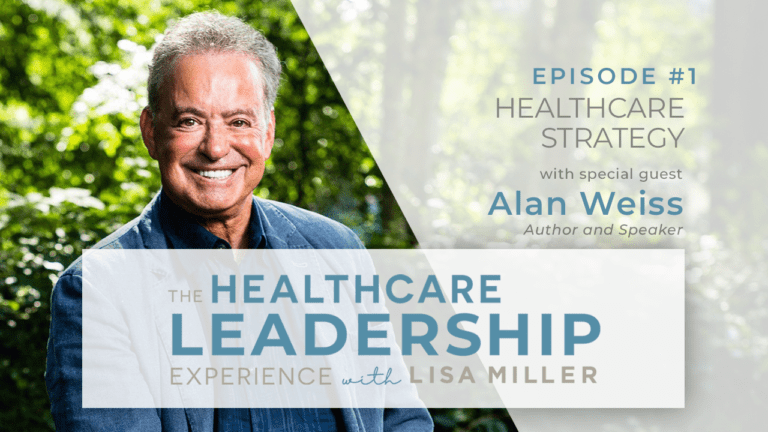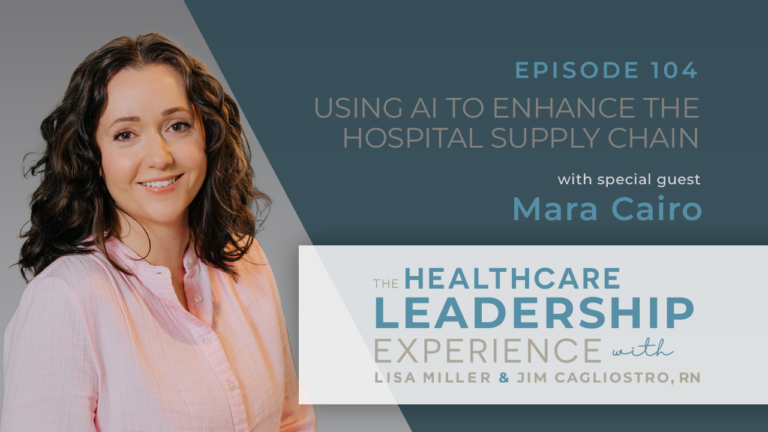Episode Introduction
Giuseppina shares her inspiration for going back to her doctorate during COVID, the importance of giving back to the world, and how higher education can support career aspirations in nursing and healthcare. She also explains the role of connection and why time is one of the most precious gifts leaders can offer.
Show Topics
- Higher education can open doors
- Paying it forward: sharing your knowledge
- Offering inspiration and guidance through mentoring
- Self-regulation and building connection
- Leadership tip: Giving the gift of time
04:00 Higher education can open doors
Giuseppina encouraged people to understand how further education can support your career aspirations.
‘’And I tell people now, young people or anyone that’s getting their nursing degree, whether it be from an associate or a baccalaureate program, to go on for the MSN. It’s really important in today’s world to get that advanced degree because you can keep it in your back pocket, and then it will allow you to have doors opened for different opportunities in your facility or in education or even as an entrepreneur. There are so many nurse entrepreneurs out now. So I attained my MSN in 2020, and our graduation was outside because of COVID, so we ended up having the graduation outside in August of 2020. And then, during that COVID spring, I realized, “What will I do with the MSN? Will it get me where I want to go?” So on that note, I evaluated, “What would I do with it? What doors will it open?” You always have to consistently evaluate, and I even tell my children, “What doors will your degree open? Where will jobs proliferate? Where can you get employment? What do you want to do with that degree, and what is the propensity of getting a job?” So then, you have to evaluate what employment opportunities does that degree align with.’’
08:44 Paying it forward: sharing your knowledge
Dr Pagnotta explained why sharing skills and knowledge can help others.
‘’I think that if you have a skill, knowledge, skill, abilities, whatever you have, and I don’t want to keep them for myself. I am on this earth for this many years and if I can share my knowledge and share my path with you, then you can take it forward and go take it somewhere. I realized in the past few months that it’s not about me. It’s about what tools I can give to you and what tools you could run with. And I don’t even have to hear from you ever again as a teacher-student, but just to know that I impart with you with the skills to learn and to grow and to get excited about learning, that’s enough for me.And also, with recent times and my recent role in the Monmouth County School Nurses Association, I realized that I’m giving my leadership skills to others, and I’m teaching them school nursing leadership and nursing leadership, and they’re rolling with it. It makes me so happy to see others flourish with the skills that I’m giving them and the excitement and fostering that relationship and creating an excitement in them in the role in nursing leadership.
14:06 Offering inspiration and guidance through mentoring
Giuseppina said it’s important for leaders to examine their motivation behind mentoring.
‘’I think it’s dual fold. It takes a lot of work, but yet it’s so rewarding. For myself, I started out as an American Nurses Association mentor. I think it was two years ago, and I was matched with a mentee across the U.S., and we would meet, I think, once every two months for 15 minutes and talk and then give each other… I would give strategies as to what her aspirations were or their aspirations, and we would continue the conversation there. It was interesting because I tend to want to inspire you. I want to inspire you in your path, and I want to look up possibilities for you. If you want to go back to college, I will look up colleges for you and look up different programs that you may like to attend in your area or that have the specific degree or certification program where you would like to go….And also, it’s important for you to examine why you would like to be a mentor and what purpose does it serve for you. For me, it just serves the purpose of guiding. I love to guide colleagues into their path, colleagues, students, friends. I really get excited and happy about doing that. It gives me joy, lots of joy to do that, to help others and discover what their potential is because sometimes you don’t know your true potential. And I have had several colleagues that have shown me my true potential.‘’
18:49 Self-regulation and building connection
Dr Pagnotta highlighted two key elements to support academic success.
‘’…. as a student and as a nurse already advancing in your degree, even if you are in an inpatient unit with a BSN, and you would like to be on a committee, shared governance committee, there are a lot of opportunities. In academia, I think initially, the administration and the chairs and your professors guide you, but then at a certain point, you kind of take over, and it’s all you because you yourself, especially in a DNP program, you have to be self-regulated and to regulate your time and to really understand, “I have this much time today. What can I get through?” So it’s important as a doctoral student for me to write down what I need to attain and also the deadlines. When is everything due and when am I going to revise? So definitely in that path. In addition, I think that it’s really important for academia to set up paths to have the students connect, especially in an online platform. MSN programs are online. DNP programs are online. They have to have a coffee place online, its own place for students to connect to each other. So the nerd that I am, and friends, colleagues can say this that I’ve had in class with, I would email all of my classmates in the beginning of the semester, say, “Hi, my name is Gius. Nice to meet you all. If you want to connect and chat about the course, here’s my number.” And so I’ve met amazing people throughout my time as an MSN and DNP and actually some classmates that I can call friends today.’’
22:03 Leadership tip: Giving the gift of time
Giuseppina said empathy, guidance and giving time through mentoring is highly rewarding for leaders.
‘’I think the connection with family and friends and colleagues is very important. And also, to have that empathy and caring aspect about yourself, I think that is a big part. I tend to be very empathetic and very caring, even with students and colleagues to guide them in the right direction even if something is… You lost a lot of points on a paper, or something happened, and I will tell them how to get most of the points next time or how to prepare so that it doesn’t happen again. I’m that type of person. And also, with mentorship, with my role, with inspiring others, you give yourself, and you give others your gift of time because your time is so important. And you give a gift to others, and you give them a gift of your time because your time is really precious. I think by me giving the gift of time to others, it’s rewarding. And you had said nurses burn out…. It’s difficult, and you’re always giving, giving. But when you are a mentor, you’re also getting that feedback from somebody else that’s saying, “Thank you. Thank you for your time. I appreciate talking to you. You inspire me.” And I think that’s important.’’
Show Links
Connect with Lisa Miller on LinkedIn
Connect with Jim Cagliostro on LinkedIn
Connect with Dr. Giuseppina Pagnotta on LinkedIn
Check out VIE Healthcare and SpendMend
You’ll Also Hear:
Gaining a doctorate during COVID: ‘’There’s nowhere to go. There’s nothing to do… So instead of watching Netflix and binge-watching and discovering new shows out there, I decided to go back to my doctorate. So then, I was immersed in leadership classes, mentorship, and population health, epidemiology. And so, I never looked back.’’
Giving more back to the world: ‘’Do you like your current position? Do you feel like you can give more back to the world? And if you feel like you can give more back to the world in your particular profession, well then, you have to consider ways to give back, either it’s with a certification or teaching CPR or teaching others or entrepreneur or patenting something.’’
Why face-to-face connection matters: ‘’I think we’re realizing the importance of that face-to-face connection. It’s great to have the digital ability, but to meet in a coffee shop, to meet someone, go for a walk, and to really get to know someone, I think that’s huge.’’
What To Do Next:
- Subscribe to The Economics of Healthcare and receive a special report on 15 Effective Cost Savings Strategies.
- There are three ways to work with VIE Healthcare:
- Benchmark a vendor contract – either an existing contract or a new agreement.
- We can support your team with their cost savings initiatives to add resources and expertise. We set a bold cost savings goal and work together to achieve it.
- VIE can perform a cost savings opportunity assessment. We dig deep into all of your spend and uncover unique areas of cost savings.
- If you are interested in learning more, the quickest way to get your questions answered is to speak with Lisa Miller at lmiller@spendmend.com or directly at 732-319-5700
Episode Transcript
DOWNLOAD THE FULL PDF TRANSCRIPT HERE
CLICK HERE TO OPEN THE FULL TRANSCRIPT
Giuseppina (00:00):
Do you like your current position? Do you feel like you can give more back to the world? And if you feel like you can give more back to the world in your particular profession, well then, you have to consider ways to give back, either it’s with a certification or teaching CPR or teaching others or entrepreneur or patenting something.
Speaker (00:22):
Welcome to the Healthcare Leadership Experience Podcast, hosted by Lisa Miller and Jim Cagliostro.
Lisa is the founder of VIE Healthcare Consulting and now managing director at SpendMend. Lisa and her team has generated over $1 billion in financial improvements for VIE’s clients since 1999.
Since 2007, Jim has been a registered nurse working in critical care, perioperative services, and outpatient settings at nationally recognized medical facilities across three states. You’ll hear conversations on relevant and trending topics in healthcare and much more. Now, here’s your hosts, Lisa and Jim.
Jim (01:01):
Hi, this is Jim Cagliostro, and you’re listening to the Healthcare Leadership Experience. Today’s guest is Dr. Giuseppina “Gius” Pagnotta. She has a myriad of responsibilities and roles, but she’s a clinical instructor for pediatric and behavioral health, an adjunct instructor at New Jersey City University, and a number of other things that I know I’ll miss, Gius, if I try to name them all. So I’m going to let you share a little bit of your story and your education and background, but today, we’re going to dive into the world of higher education and its role in preparing and developing healthcare leaders. So Gius, and I should say this before we start, there’s a very personal connection that Gius has been an incredible encouragement and role model and mentor for my own wife, specifically in the school nursing side of things. So Gius served as a school nurse for many years, so I’m sure that’ll come into play in our conversation. But Gius, I want to thank you from a personal perspective, but also just thank you for being a guest today on the show.
Giuseppina (01:59):
Yes, my pleasure. My pleasure. So yes, I’m Dr. Giuseppina Pagnotta. I started my nursing career back in 1990 when diploma school nursing was a thing and was a very big part of our world in the United States. And I continued on to experience growth and advancement and figuring out my way as all nurses do or any student may do that starting off in a field. And I decided to continue on with my BSN and then my school nurse certification back at the time, finishing that in 1998. I started my school nursing career in Newark as a school nurse in one of the schools. And then, I continued on to get my master’s in health administration.
(02:46):
Back at the time, I had a young family, so the clinical involved with the MSN, I wasn’t able to do that. So I decided on getting the master’s in health administration. I felt that a master’s at the time was important for me. So I continued on, and I flourished as a school nurse in different schools throughout New Jersey, and I migrated to the Shore. And so, I transferred several jobs along the way down the parkway, and I ended up in Central Jersey. Some of you may think it’s South, but it is Central, apparently.
Jim (03:22):
That’s right. Make that clear. Thank you.
Giuseppina (03:24):
Yes. So I have arguments with friends, but it is Central Jersey, apparently. We don’t live in South Jersey, but I tell people I live in South Jersey. So I ended up in Neptune Township School District as a school nurse, and I was there for 20 years until I retired in October. So in the middle of that, my first master’s was in 2002, and I thought that that was it for me until a very good colleague back in 2018 mentioned that I should get my MSN. And I actually, for the last 17 years between the first master’s and contemplating getting the MSN, I always wanted the MSN. And I tell people now, young people or anyone that’s getting their nursing degree, whether it be from an associate or a baccalaureate program, to go on for the MSN. It’s really important in today’s world to get that advanced degree because you can keep it in your back pocket, and then it will allow you to have doors opened for different opportunities in your facility or an education or even as an entrepreneur. There are so many nurse entrepreneurs out now.
(04:35):
So I attained my MSN in 2020, and our graduation was outside because of COVID, so we ended up having the graduation outside in August of 2020. And then, during that COVID spring, I realized, “What will I do with the MSN? Will it get me where I want to go?” So on that note, I evaluated, “What would I do with it? What doors will it open?” You always have to consistently evaluate, and I even tell my children, “What doors will your degree open? Where will jobs proliferate? Where can you get employment? What do you want to do with that degree, and what is the propensity of getting a job?” So then, you have to evaluate what employment opportunities does that degree align with. So that’s when I realized that for me, I wanted to be a nursing educator, and I realized that I needed a doctorate.
(05:31):
So that’s why I applied, and I made a path. I had some networks and some contacts, and I evaluated and did a little detective work about what I needed. And during that summer, I actually took a certification online at home because it was COVID, and it was such an experience. If you’ve never taken a certification at home, it is the proctor has to evaluate everything around your room, the chair, the behind you, underneath your chair, your table, and everything had to be removed from the area, and the proctor took over my screen. So it was a really fascinating time.
(06:16):
And so, I started with the DNP in the fall of 2020, and I never looked back. It was tough, and I had my family, very supportive. I was frequently getting meals sitting right here at my desk doing homework, sitting down for hours and hours. And I would definitely have to say that for me, the pandemic brought me to the realization that the doctorate was a really opportunistic time. There’s nowhere to go. There’s nothing to do. So what do all people do? I decided to go back and get my doctorate during the COVID. I’m sure not many people can say that. So I figured-
Jim (06:55):
Most people started like a new Netflix series or something, binge-watch the show. Yes, yes.
Giuseppina (07:00):
No, I decided to go back to a doctoral program. So instead of watching Netflix and binge-watching and discovering new shows out there, I decided to go back to my doctorate. So then, I was immersed in leadership classes, mentorship, and population health, epidemiology. And so, I never looked back. And I am so ecstatic and happy that I’m sitting here with you today and can say that Giuseppina Pagnotta, DNP, Doctor of Nursing Practice.
Jim (07:33):
I love that you shared, well, the importance of having a supportive family and the sacrifice and the commitment that it takes. But also, I really appreciate, and this is something I’m taking notes for my own kids, they’re younger, but thinking about where do I want to go? Where is this going to take me? I think a lot of times, we go into higher education like, “Well, it’ll just be nice to have.” And yes, like you said, it will open many doors, but I think it is so valuable to say, “Where is this going to take me? What specific doors could this open,” and ask those questions, and I think that helps. Stay committed, make those sacrifices, keep driving forward. So I love that you shared all that in your experience. And I was going to ask you, you probably covered this really, but in terms of seeing yourself in higher education, was that something even at a young age, was that encouraged?
(08:18):
I’ll just share briefly. When I was in undergraduate, getting my bachelor’s, getting my BSN, all the professors were like, “Go on, get your master’s.” And I said, “Absolutely not. I’ll do my four years. I’m done.” And I ended up going to get my master’s in health education because my employer was helping to pay for it. I’ll be honest. That was one of the big factors. Was there any tipping point for you? I know you kind of shared that in your story. Was it something at a young age? Do you enjoy the learning side of it? If you don’t mind sharing a minute on that.
Giuseppina (08:44):
Sure. No, I definitely enjoy the learning side of it. I think that if you have a skill, knowledge, skill, abilities, whatever you have, and I don’t want to keep them for myself. I am on this earth for this many years, and if I can share my knowledge and share my path with you, then you can take it forward and go take it somewhere. I realized in the past few months that it’s not about me. It’s about what tools I can give to you and what tools you could run with. And I don’t even have to hear from you ever again as a teacher-student, but just to know that I impart with you with the skills to learn and to grow and to get excited about learning, that’s enough for me.
(09:35):
And also, with recent times and my recent role in the Monmouth County School Nurses Association, I realized that I’m giving my leadership skills to others, and I’m teaching them school nursing leadership and nursing leadership, and they’re rolling with it. It makes me so happy to see others flourish with the skills that I’m giving them and the excitement and fostering that relationship and creating an excitement in them in the role in nursing leadership.
Jim (10:09):
I love that. Even just thinking of seeing your own children make those steps of that, the baby starts walking or the first time riding a bike or graduating or whatever the case may be, you spend time. You’re investing in these students and to see them go forward. I mean, I definitely see what you’re saying in terms of we may never hear from them again, but it is nice when you get that email, or you get that notice of-
Giuseppina (10:29):
It is.
Jim (10:29):
… like, “Hey, thank you for the time that you gave, the example that you were.”
If we can jump into this, just the fact that higher education has gotten a bad rap in recent years in some circles. Think about the cost, the time required, is it necessary, and we can get into that if you’d like to, but what would you say to anyone who has reservations about the value of higher education? Maybe someone who’s in healthcare working full-time and debating whether or not they should further their education as part of their professional journey, what advice would you give?
Giuseppina (11:00):
I would say to them, “Examine what you would like to do.” What are your own aspirations? If your own aspirations, the only way you can get there is with an advanced degree. Well then, you have to look at that path and make it happen because then, you’re going to look back and say, “Oh, I should have gotten that degree. I never got that degree.” And then, you’ll be like me, 17 years later going for the degree. And in a sense, you have to examine, what do you want? Do you like your current position? Do you feel like you can give more back to the world? And if you feel like you can give more back to the world in your particular profession, well then, you have to consider ways to give back, either it’s with a certification or teaching CPR or teaching others or entrepreneur or patenting something. So it depends on what you’d like.
(11:55):
But again, examine, and I write everything down. So write down a list of what you would like and how to get there, or perhaps maybe if you would like a certain position in your field in nursing, look at what the credentials involved on a posting are. And for me, it solidified my path when all nursing educator positions that I would like were all doctorally prepared. So that’s why I chose the doctoral path.
Jim (12:23):
I love it, and it’s something that… It’s a difficult thing because I know, again, I’m just trying to get into my wife’s head when she first started for her MSN, the certification for the school nursing. It’s an overwhelming task to think, “Hey, I’m working. The kids are young,” whatever responsibilities we have in life, but if she pushes that off, life happens. You know that, right?
Giuseppina (12:43):
Yeah.
Jim (12:43):
And it’s something that if you keep pushing it off, it may never happen. And so, kind of jumping in with both feet and obviously, there’s some people that have that mindset. You mentioned a few times now, the entrepreneurs. I don’t have that mindset. We’ve had a few guests on here, clearly entrepreneurs, and they said, “Yeah, if I want to do what I’m doing, I need to go and get this type of training, this type of education.” So thank you for all of that. I think that’s great advice.
(13:08):
If you’re just tuning in, you’re listening to the Healthcare Leadership Experience, and I’m your host, Jim Cagliostro. This show is sponsored by Healthcare Consulting, a SpendMend company, which provides leading edge financial and operational consulting for hospitals, healthcare institutions, and other providers of patient care.
Since 1999, VIE has been a recognized leader in healthcare costs, hospital purchased services, healthcare benchmarking, supply chain management, and performance improvement. You can learn more about VIE Healthcare Consulting at viehealthcare.com and spendmend.com.
(13:40):
So if I can ask your opinion on something, Gius, where does experience and mentorship fit into the process? I know I shared briefly already just the value that Lisa saw in terms of having you as a mentor when she started out in school nursing, but how does that experience, and mentorship piece connect with higher education? Is it easy? Is that something that you have seen play out, or is that really take a lot of work connecting the higher education with the mentorship?
Giuseppina (14:06):
I think it’s dual fold. It takes a lot of work, but yet it’s so rewarding. For myself, I started out as an American Nurses Association mentor. I think it was two years ago, and I was matched with a mentee across the U.S., and we would meet, I think, once every two months for 15 minutes and talk and then give each other… I would give strategies as to what her aspirations were or their aspirations, and we would continue the conversation there. It was interesting because I tend to want to inspire you. I want to inspire you in your path, and I want to look up possibilities for you. If you want to go back to college, I will look up colleges for you and look up different programs that you may like to attend in your area or that have the specific degree or certification program where you would like to go.
(15:02):
And also, it’s important for you to examine why you would like to be a mentor and what purpose does it serve for you. For me, it just serves the purpose of guiding. I love to guide colleagues into their path, colleagues, students, friends. I really get excited and happy about doing that. It gives me joy, lots of joy to do that, to help others and discover what their potential is because sometimes you don’t know your true potential. And I have had several colleagues that have shown me my true potential. And it wasn’t until that that I said to myself, “I’m going to go for the DNP, and I’m going to do it.” And some of my colleagues will say to me, “How do you find the time, and how do you do that,” or “How do you think like that?” And I just do. It just comes like second nature. So on the note of mentorship, the other exciting part is that we had in our Monmouth County School Nurses Association, we started a small pilot of a mentorship program this past January and-
Jim (16:13):
Yes, please explain that. That’s great.
Giuseppina (16:15):
We matched up five mentee and mentors. So we did a Google survey, and we evaluated which of our experienced school nurses would like to offer assistance, and I modeled it after the American Nurses Association. And so we kept it to 15 minutes on a phone call, on a Meet, or on a Zoom to talk about that. And also, in today’s, it’s also on the iPhone. If you iPhone to iPhone, it’s easier.
Jim (16:47):
Sure.
Giuseppina (16:47):
Yes. And we started that this past January, and it was very exciting because we had five matches. And then, we would verify and just let them know to make sure they’re cognizant of each other’s work-life balance and the balance of their life and not to take advantage and to keep it to the 15 minutes. We have been successful with that, and the school nurses, both the experienced and inexperienced, were very happy to have the connection. So that was very exciting to me. And I hope to headway that again for the ’24-’25 school year and again have that program.
Jim (17:28):
I love that you’re sharing that. I love that you’re doing that, and you talked about the importance of connection. And even that 15 minutes, even on this podcast… And look, you go on LinkedIn. You go wherever. There’s always talk of burnout of not just nurses, but bedside clinicians, of those in healthcare. It can be a very burdensome because you’re constantly giving. And so, the benefit of having that connection, even if it’s just 15 minutes, but it’s regular, and you know you have someone to reach out to. And you said two words that stood out to me. You said guiding and inspiring, something that you enjoy doing, but I know in the academic setting, yes, that can happen, but I believe it’s so much more likely to happen in those one-to-one situations or in that mentoring setup where you really can guide someone, and you can really inspire someone.
(18:15):
And I’ve had great professors and teachers who are able to do that, but I think the setting is more conducive when it’s this one-to-one mentorship. And so, that kind of leads to the next thing I want to ask you.
In terms of academic institutions, how are they doing in terms of preparing healthcare leaders to enter the workforce? Has there been a shift in recent years? In your opinion, is there anything lacking in terms of the education side of things or the higher… Is this like, “Hey, go and get your degree,” and then here, sends you to the wolves, or do you feel like there’s a good transition in terms of preparing those for healthcare leadership?
Giuseppina (18:49):
I think it’s twofold. One in that you as a student and as a nurse already advancing in your degree, even if you are in an inpatient unit with a BSN, and you would like to be on a committee, shared governance committee, there are a lot of opportunities. In academia, I think initially, the administration and the chairs and your professors guide you, but then at a certain point, you kind of take over, and it’s all you because you yourself, especially in a DNP program, you have to be self-regulated and to regulate your time and to really understand, “I have this much time today. What can I get through?” So it’s important as a doctoral student for me to write down what I need to attain and also the deadlines. When is everything due and when am I going to revise? So definitely in that path.
(19:52):
In addition, I think that it’s really important for academia to set up paths to have the students connect, especially in an online platform. MSN programs are online. DNP programs are online. They have to have a coffee place online, its own place for students to connect to each other. So the nerd that I am, and friends, colleagues can say this that I’ve had in class with, I would email all of my classmates in the beginning of the semester, say, “Hi, my name is Gius. Nice to meet you all. If you want to connect and chat about the course, here’s my number.” And so I’ve met amazing people throughout my time as an MSN and DNP and actually some classmates that I can call friends today.
Jim (20:42):
I love that, Gius. And again, you’re making me think, and sorry to get personal, but with Lisa, encouraging her to go and get that higher education, to get that second degree, that was tough in and of itself. And then entering a new role as a school nurse, very different from working on the floor, working in the hospital, but having that connection with you early on her first year, going into just a new role with kids, really, “Hey, what is this world about? What does it look like,” and having that connection, someone like you to guide and inspire. Yes, the degree, the higher education, it’s necessary to open certain doors, so that step, great. But then, in order to smoothly transition and to be effective in terms of your work as a nurse, and like you said, paying it forward and giving to others, that’s what healthcare is all about, it’s so important to have that, that mentor, that someone you can look up to, that connection.
(21:31):
And more and more, I agree. I think we’re realizing the importance of that face-to-face connection. It’s great to have the digital ability, but to meet in a coffee shop, to meet someone, go for a walk, and to really get to know someone, I think that’s huge.
I’ve loved everything you’ve shared, Gius, and I’m sure we could talk for even longer, but I always like, at the end of our episodes, I like to give our guests the opportunity just to share any leadership lesson that you’ve learned through your career, anything that has really kind of kept you strong, kind of carried you through to this point that you’d like to leave with our audience, please. The floor is yours.
Giuseppina (22:03):
I think the connection with family and friends and colleagues is very important. And also, to have that empathy and caring aspect about yourself, I think that is a big part. I tend to be very empathetic and very caring, even with students and colleagues to guide them in the right direction even if something is… You lost a lot of points on a paper, or something happened, and I will tell them how to get most of the points next time or how to prepare so that it doesn’t happen again. I’m that type of person.
(22:37):
And also, with mentorship, with my role, with any inspiring others, you give yourself, and you give others your gift of time because your time is so important. And you give a gift to others, and you give them a gift of your time because your time is really precious. I think by me giving the gift of time to others, it’s rewarding. And you had said nurses burn out, this, that. It’s difficult, and you’re always giving, giving. But when you are a mentor, you’re also getting that feedback from somebody else that’s saying, “Thank you. Thank you for your time. I appreciate talking to you. You inspire me.” And I think that’s important.
Jim (23:21):
I love it, Gius. Well said. And I think for any of our listeners, we have listeners who are in the administrative side of things or clinicians, and I think for anybody considering higher education, everything you shared today has been extremely valuable. So thank you so much for being on the show today.
Giuseppina (23:36):
My pleasure.
Jim (23:37):
Thank you to our listeners who spent time with us today. If you have any questions about VIE Healthcare Consulting, a SpendMend company, or if you want to reach out to me or Lisa Miller, you can find us on LinkedIn.
We at SpendMend love helping hospital leaders uncover financial leakage and improve the patient experience. We’re hoping that today’s episode gave you some new insights to consider and use in your own career.
And once again, Gius, thank you so much for your time. Thank you for sharing your insight today.
Giuseppina (24:01):
My pleasure.
Speaker (24:03):
Thanks for listening to the Healthcare Leadership Experience podcast. We hope you’ve enjoyed this episode. If you’re interested in learning new strategies, best practices, and ideas to utilize in your career and healthcare organization, check out our website at thehealthcareleadershipexperience.com. And oh yeah, don’t forget to rate and review us. And be sure to join Lisa and Jim next time on the Healthcare Leadership Experience podcast. Thanks again for listening.
